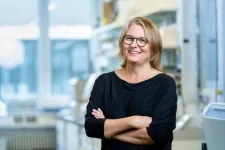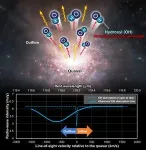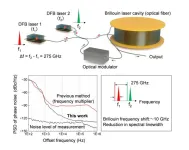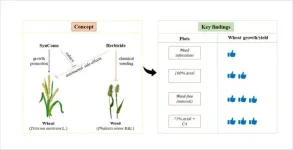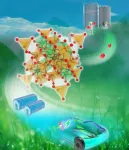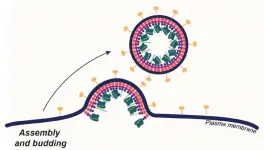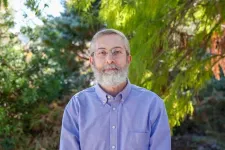(Press-News.org) The renowned virologist from the University of Zurich receives the major award from the Bill & Melinda Gates Foundation for an innovative project on HIV vaccines. The grant will fund vaccine studies in well-studied groups of people living with HIV in Switzerland and South Africa to guide the design of a preventative HIV vaccine.
Alexandra Trkola, Professor of Medical Virology at the University of Zurich, has been awarded a 3-year grant (INV-061559) from the Bill & Melinda Gates Foundation for the project “RENEW clinical studies in people with HIV”. Together with her co-principal investigators Huldrych Günthard (University Hospital Zurich and UZH), Penny Moore (University of the Witwatersrand and NICD, South Africa) and Nigel Garrett (Centre for the Aids Programme of Research in South Africa, CAPRISA) she heads a multi-national study to explore a novel concept to evaluate HIV vaccine candidates. The project consists of two harmonized immunization trials, one in Switzerland and one in South Africa, that recruit 30 participants each from demographically distinct cohorts of people living with HIV, the Swiss HIV Cohort Study and the CAPRISA cohort.
Alexandra Trkola and her colleagues will assess a safe and efficient way to conduct in vivo tests of potential preventive and therapeutic HIV vaccines. The goal is to stimulate the production of broadly neutralizing antibodies by administering the vaccines to people with HIV who are undergoing antiretroviral therapy and are virally suppressed. The project extends and capitalizes on decades of research by Alexandra Trkola and her team. Her work focuses on in-depth exploration of HIV-1 infection, HIV’s evasion strategies against the human immune system, and the development of antibodies with the capability to neutralize and, consequently, eliminate the virus.
Trkola joins the Collaboration for AIDS Vaccine Discovery
With this grant, Alexandra Trkola will join the Collaboration for AIDS Vaccine Discovery (CAVD), an international network of Gates-funded researchers dedicated to developing novel HIV vaccines and advancing promising candidates into clinical trials. CAVD promotes collaboration, the sharing of scientific information, and the standardization of research methods to accelerate progress in AIDS vaccine development. Through CAVD, the foundation provides the immunogen and adjuvants for the RENEW trial in addition to the three million USD grant awarded to cover the clinical safety assessment and basic immunogenicity analysis.
The Bill & Melinda Gates Foundation was launched in 2000 and is one of the largest charitable foundations in the world. In the past, the foundation has already pledged substantial funds to support the development of a vaccine for HIV/AIDS.
About Alexandra Trkola
Alexandra Trkola studied in Vienna. Following an MSc in Applied Microbiology, Trkola specialized in HIV antibody research for her PhD. From 1998 until 2000, she conducted her research at the Aaron Diamond AIDS Research Center in New York and was appointed assistant professor at The Rockefeller University, New York, in 1999. In 2000 she joined the Department of Infectious Diseases and Hospital Epidemiology at the University Hospital Zurich. In 2008, she was made a full professor in medical virology at the University of Zurich, taking over as head of department later that year.
END
Alexandra Trkola awarded US $3 million grant
2024-02-01
ELSE PRESS RELEASES FROM THIS DATE:
Trading between households in smart energy communities: the more the merrier?
2024-02-01
Our energy systems are undergoing rapid change. Many households are generating electricity with solar panels, and there are new sources of demand and storage, such as charging electric vehicles and home batteries. Local prosumers (energy consumers who also generate and store energy) are taking control of their own energy supply. This development is prompting the creation of energy communities and micro-grids, such as the SchoonSchip community in the north of Amsterdam.
Energy communities allow consumers ...
Tidal landscapes a greater carbon sink than previously thought
2024-02-01
Mangroves and saltmarshes sequester large amounts of carbon, mitigating the greenhouse effect. New research from the University of Gothenburg shows that these environments are perhaps twice as effective as previously thought.
Natural habitats flooded by the tide form ecosystems that captures large amounts of carbon, which can help to mitigate climate change. Carbon dioxide is stored in the biomass and in the muddy soils. Therefore, several governments have launched blue carbon market initiatives to encourage landowners to restore and preserve mangrove and saltmarsh ecosystems, similar to the rainforest.
Large ...
Relocated songbirds can successfully learn the diversity of song they need to survive
2024-02-01
Nestling songbirds relocated as part of conservation programmes successfully learn the song repertoires they need to communicate – and ultimately survive – in the wild, a new study has found.
The research, published in the journal Conservation Science and Practice, is the first to follow translocated songbird chicks over time to assess their song development.
It focused on populations of cirl buntings (Emberiza cirlus), taken from a number of sites in Devon before being hand-reared and then reintroduced in Cornwall as part of a major programme co-ordinated ...
Understanding rapid weight loss in older women: Message from the heart
2024-02-01
Unexplained rapid weight loss in older people could be a sign of underlying disease and can be linked with increased risk of falls and fractures, as well as a poorer long-term prognosis.
The understanding of factors that could contribute to rapid weight loss remains poor, with current treatments including correcting suboptimal dietary and physical activity behaviors.
New research by Edith Cowan University (ECU) Postdoctoral Research Fellow Dr Cassandra Smith noted that abdominal aortic calcification (AAC), a marker of advanced blood vessel disease, was linked to higher risk of rapid weight ...
Photonics-based wireless link breaks speed records for data transmission
2024-02-01
Osaka, Japan – From coffee-shop customers who connect their laptop to the local Wi-Fi network to remote weather monitoring stations in the Antarctic, wireless communication is an essential part of modern life. Researchers worldwide are currently working on the next evolution of communication networks, called “beyond 5G” or 6G networks. To enable the near-instantaneous communication needed for applications like augmented reality or the remote control of surgical robots, ultra-high data speeds will be needed on ...
Field weed control: Synthetic communities slash herbicide use
2024-02-01
Synthetic microbial communities (SynComs) are emerging as powerful allies in the battle against weeds. These carefully crafted assemblies of microorganisms, such as compatible Pseudomonas strains, are designed to target specific weeds while promoting crop growth. The application of herbicides with SynComs will be essential to understand their synergistic effects for controlling weed and promoting wheat growth, so that provides a sustainable and eco-friendly weed control strategy. By harnessing the collective strength of Pseudomonas SynComs, this research brings us ...
Powering the future: New material developed for better supercapacitor applications
2024-02-01
Supercapacitors, also known as ultracapacitors or electric double-layer capacitors (EDLCs), are advanced energy storage devices with unique characteristics. Unlike traditional batteries, supercapacitors store energy through the electrostatic separation of charges at the interface between an electrolyte and a high-surface-area electrode. This mechanism allows for rapid energy storage and release, enabling supercapacitors to deliver high power bursts and exhibit exceptional cycle life.
Supercapacitors play a pivotal role in the realm of renewable energy and environmental conservation. In the context of renewable energy, supercapacitors serve as crucial components ...
Highly targeted CRISPR delivery system advances gene editing in living animals
2024-02-01
Most approved gene therapies today, including those involving CRISPR-Cas9, work their magic on cells removed from the body, after which the edited cells are returned to the patient.
This technique is ideal for targeting blood cells and is currently the method employed in newly approved CRISPR gene therapies for blood diseases like sickle cell anemia, in which edited blood cells are reinfused in patients after their bone marrow has been destroyed by chemotherapy.
A new, precision-targeted delivery method for CRISPR-Cas9, published Jan. 11 in the journal Nature Biotechnology, enables gene editing on very specific subsets of cells while still in the body — ...
The Lancet Public Health: Transgender, non-binary, and gender diverse people more likely to have a long-term mental health condition, first England-wide study suggests
2024-02-01
Study of 1.5 million people over the age of 16 in England, including nearly 8,000 transgender people, finds a higher proportion of transgender adults report having a long-term mental health condition than cisgender adults.
Additionally, those with a gender identity other than cisgender male or cisgender female were more likely to report their mental health needs were unmet at their last general practice appointment.
Authors call for the NHS to become more gender-inclusive, including by introducing better training for health-care professionals to improve their ability ...
UT extension specialist selected to coordinate national network
2024-02-01
A University of Tennessee Extension specialist has been selected to help lead a new national effort to connect resources and individuals in the quickly evolving food and agriculture career sector.
Clint Cummings, Extension specialist in the Department of Family and Consumer Sciences, will serve as the National Network Lead and Regional Network Coordinator for the Southern Region for the new AgriProspects Workforce Development Network project. This project is being conducted through the Extension Foundation in collaboration with the ECOP (Extension Committee on Organization and Policy) Economic & Workforce Development Program Action Team and NECIW (National Extension ...
